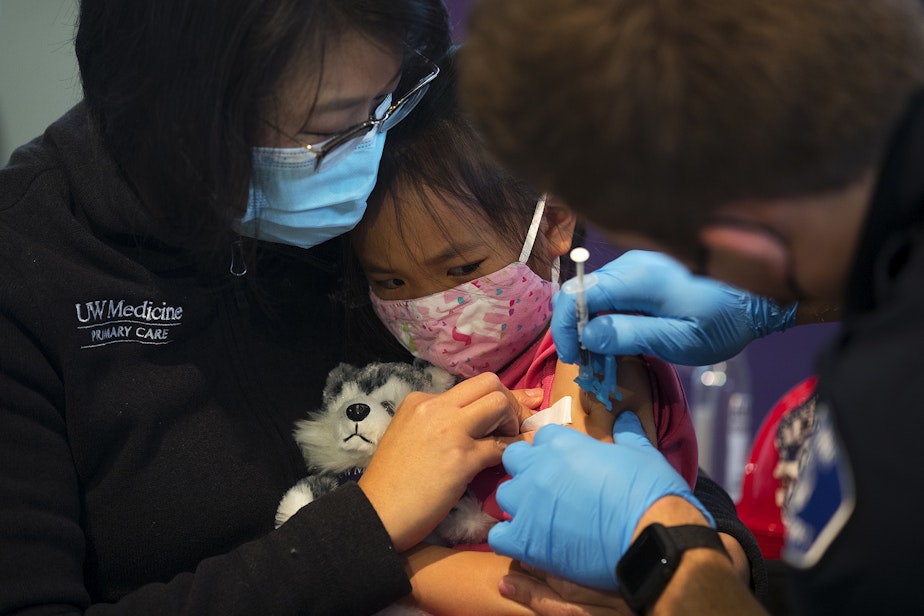Highest ever Covid cases predicted by Christmas as Omicron spikes

With the omicron variant rapidly spreading through the community, Washington state could see its highest level of coronavirus cases by the end of 2021.
That's the message from health care officials at a Friday briefing on the alarming rate of spread, that included representatives from UW Medicine, Fred Hutchinson, and King County Health Officer Dr. Jeff Duchin.
Officials repeated the words "worried" and "concern" as a major omicron spread looms on Washington's horizon. That wave has already started to grow locally, and has been attributed to roughly 40% of Covid cases.
RELATED: Health officials pin Covid outbreaks on high school wrestling tourneys
"I do think we have a week or two more of this exponential growth left," said Trevor Bedford with Fred Hutchinson Cancer Research Center, further noting he expects to see around 2,000 cases per day within a couple weeks.
“I am certain this will be the highest case counts we have seen throughout the pandemic," he said.
Sponsored
All officials are worried about the large portion of unvaccinated or partially vaccinated people in the region, as well as people who are eligible for a booster and haven't gotten one.
“Omicron is going to find many of these people," Dr. Duchin said.
RELATED: Omicron is spreading in King County. Health officials expect a 'rapid increase' over the holidays
That is prompting greater concern for hospital capacity. While in-patient numbers have declined recently, and beds opened up, hospitals still face a scenario where they are overwhelmed with cases and have to decide who gets care.
Dr. Santiago Neme with UW Medicine said that the dramatic increase in cases will be added on top of staffing shortages that hospitals are experiencing due to years of Covid trauma.
“We are not going to stop the spread," Dr. Duchin said. "It’s this large number of people who will be infected at one time; that’s the concern."
Sponsored
Bedford added that, despite previous hopes that omicron would overtake the delta variant, and (even more hopefully) cause less severe disease to help bring the population out of the pandemic, he is now concerned that will not be the case.
“I am quite worried that in nine months we will have both delta and omicron circulating," he said, "and it’s not omicron that takes us out of this … we are not out of the woods.”
Instead, Washington could see "a very big number of cases each year and a small number of severe outcomes from those cases, but that will still be something we will have to deal with as a society next year and the year after that, and the year after that.”
Duchin said that he is optimistic that, through exposure and more vaccination, the virus will eventually diminish to a seasonal event, but he agrees that outcome is a long way out.
“Over time with these repeated infections … and vaccinations … our immune system will be exposed without getting severely ill," Duchin said. “I think that is the state we can look forward to where this is reduced, more or less, to something like an influenza-like illness where it is important for people to be vaccinated, especially high risk people, but an infection is not a severe life-threatening event."
Sponsored
"We still have the long Covid thing that is not well understood and we have to learn more about that … but hopefully overtime, I think this will be less of a human health threat, but this will not go to go away very quickly."
What to do/know about omicron
- Be fully vaccinated and up-to-date: Have both shots of a Covid vaccine. Get a booster shot as soon as you are eligible. The increased antibody protection from these vaccines offer the best first response to an infection.
- Breakthrough infections among vaccinated people, and reinfections, are likely. There is early evidence that indicates an omicron infection is more mild that previous variants. But this information is incomplete and experts warn it is too early to draw any conclusions. Despite any mild illness, the massive increase in case loads can overwhelm hospital systems.
- Wear a mask: Dr. Duchin noted Friday that there is a greater supply of N95 and KN95 masks that not only help reduce the coronavirus risk for the wearer, they prevent infected people from spreading the virus in public.
Do not confine yourself in an area with poor circulation. The best environment is outdoors. The virus spread best in enclosed spaces with little airflow.

